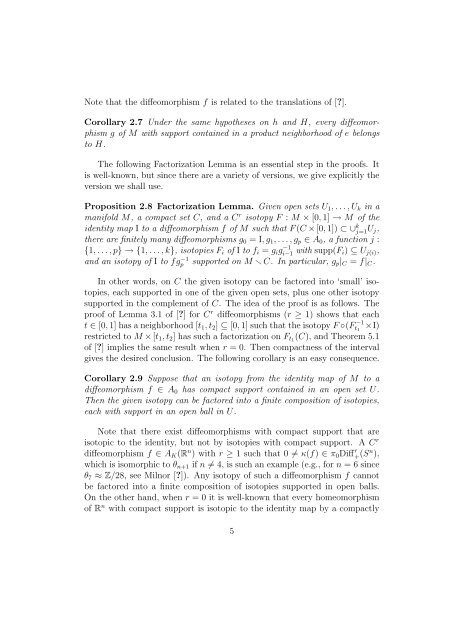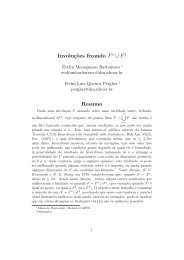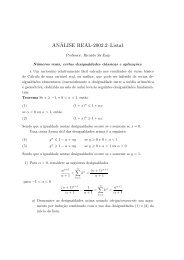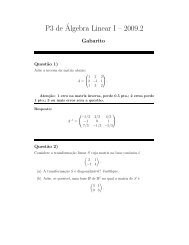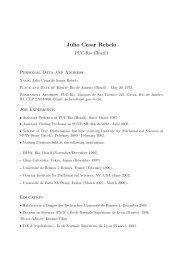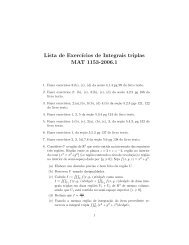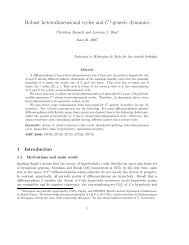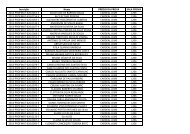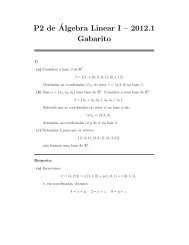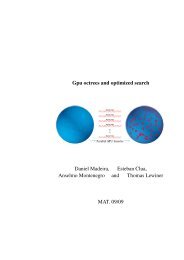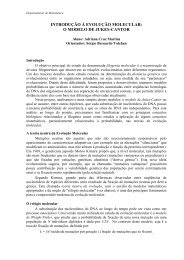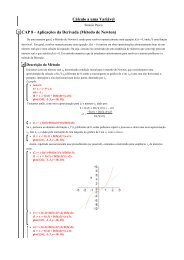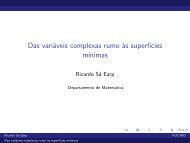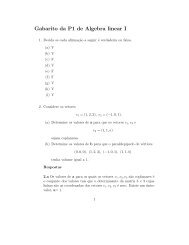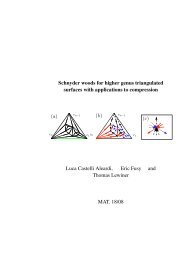NORMAL SUBGROUPS OF DIFFEOMORPHISM AND ...
NORMAL SUBGROUPS OF DIFFEOMORPHISM AND ...
NORMAL SUBGROUPS OF DIFFEOMORPHISM AND ...
You also want an ePaper? Increase the reach of your titles
YUMPU automatically turns print PDFs into web optimized ePapers that Google loves.
Note that the diffeomorphism f is related to the translations of [?].<br />
Corollary 2.7 Under the same hypotheses on h and H, every diffeomorphism<br />
g of M with support contained in a product neighborhood of e belongs<br />
to H.<br />
The following Factorization Lemma is an essential step in the proofs. It<br />
is well-known, but since there are a variety of versions, we give explicitly the<br />
version we shall use.<br />
Proposition 2.8 Factorization Lemma. Given open sets U 1 , . . . , U k in a<br />
manifold M, a compact set C, and a C r isotopy F : M × [0, 1] → M of the<br />
identity map I to a diffeomorphism f of M such that F (C × [0, 1]) ⊂ ∪ k j=1U j ,<br />
there are finitely many diffeomorphisms g 0 = I, g 1 , . . . , g p ∈ A 0 , a function j :<br />
{1, . . . , p} → {1, . . . , k}, isotopies F i of I to f i = g i g −1<br />
i−1 with supp(F i) ⊆ U j(i) ,<br />
and an isotopy of I to fgp −1 supported on M C. In particular, g p | C = f| C .<br />
In other words, on C the given isotopy can be factored into ‘small’ isotopies,<br />
each supported in one of the given open sets, plus one other isotopy<br />
supported in the complement of C. The idea of the proof is as follows. The<br />
proof of Lemma 3.1 of [?] for C r diffeomorphisms (r ≥ 1) shows that each<br />
×I)<br />
restricted to M × [t 1 , t 2 ] has such a factorization on F t1 (C), and Theorem 5.1<br />
of [?] implies the same result when r = 0. Then compactness of the interval<br />
gives the desired conclusion. The following corollary is an easy consequence.<br />
t ∈ [0, 1] has a neighborhood [t 1 , t 2 ] ⊆ [0, 1] such that the isotopy F ◦(F −1<br />
t 1<br />
Corollary 2.9 Suppose that an isotopy from the identity map of M to a<br />
diffeomorphism f ∈ A 0 has compact support contained in an open set U.<br />
Then the given isotopy can be factored into a finite composition of isotopies,<br />
each with support in an open ball in U.<br />
Note that there exist diffeomorphisms with compact support that are<br />
isotopic to the identity, but not by isotopies with compact support. A C r<br />
diffeomorphism f ∈ A K (R n ) with r ≥ 1 such that 0 ≠ κ(f) ∈ π 0 Diff r +(S n ),<br />
which is isomorphic to θ n+1 if n ≠ 4, is such an example (e.g., for n = 6 since<br />
θ 7 ≈ Z/28, see Milnor [?]). Any isotopy of such a diffeomorphism f cannot<br />
be factored into a finite composition of isotopies supported in open balls.<br />
On the other hand, when r = 0 it is well-known that every homeomorphism<br />
of R n with compact support is isotopic to the identity map by a compactly<br />
5


